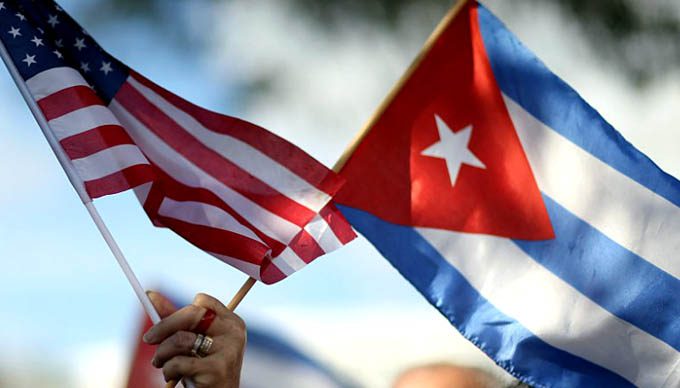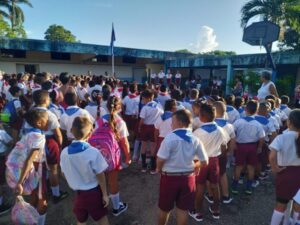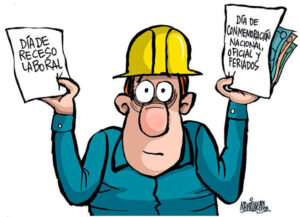«The period saw a strengthening of solidarity and a constant struggle for the exclusion of Cuba from the list of countries that allegedly sponsor terrorism and against the genocidal economic blockade of the United States against Cuba,» said Ambassador Lianys Torres.
Torres, head of the Cuban Mission in the United States, told Prensa Latina that collective efforts have allowed the growth of this support network – which includes more than 65 organisations based here – and the incorporation of young people.
She also highlighted «the coordinated work between groups from different sectors of society (Afro-American, religious, cultural, sports, academic, trade unions, among others), extending its reach, with strategies that allowed the voices of our peoples to be heard for the sovereignty and dignity of Cubans, against imperialism and genocide».
He commented that among the most significant initiatives was the Take Cuba Off The SSOT List campaign.
Strategies ranging from sending letters and signatures, phone calls, requesting meetings with congressmen, to public demonstrations in support of Cuba were deployed, he argued.
Social networks also became, he said, a new battleground for friends in solidarity for the truth, against the disinformation campaigns generated by the mainstream Western media.
Torres pointed out that 2024 saw an increase in the number of delegations to Cuba, both from organisations and members of the different solidarity brigades that visited the country.
«Solidarity activists from the United States constituted the largest delegation that participated during the May Day celebrations in Cuba, as well as in other events held during the year in the national territory,» the diplomat stressed.
It is also important to highlight «the work and links of important trade unions in the country with the solidarity movement. With this year’s efforts, more than 116 resolutions have been passed by organisations, city and state councils, and trade unions, demanding Cuba’s removal from the terrorist list,» Torres emphasised.
Faced with the difficult situation that Cuba is going through, solidarity groups led nationwide support campaigns to raise funds and send important donations, including the «Saving Lives» campaign, which made it possible to send pacemakers to our country, he argued.
In addition, campaigns were carried out to send medicines, medical equipment, food, electrical generators and other supplies for the victims of the climatic events that hit the nation, said the representative of the Caribbean nation.
During the Annual Conference of the National Network on Cuba (NNOC) in November 2024, its leadership «foresaw a year 2025 with abundant work to build more solidarity with Cuba from the United States, in order to expand its networks even more, and to integrate itself into international campaigns for our homeland,» she concluded.
THE CHALLENGES AHEAD
NNOC co-chair Cheryl LaBash, in her assessment of the work in the calendar that is coming to an end, noted that 2025 holds a number of challenges for both Cuba and the people of the United States.
«We have optimism, energy and determination to meet those challenges,» said LaBash, who said the struggle was driven by «people who travelled to Cuba and saw there the hope of creating a better future than what they envision for themselves in the United States».
The list of those interested in the May Day 2025 International Brigade has already grown to more than 200, each armed with suitcases or duffel bags filled with material aid to counter the effects of the blockade, he said.
«The slow, starvation genocide imposed on Cuba by the United States against the will of the world is not acceptable,» LaBash said.
Diana Block, a member of NNOC in the Bay Area in San Francisco, California, appreciated the role of unity in 2024. «It’s being built here among different groups in the face of this new period when there will be a new (Donald) Trump administration with (Florida Senator) Marco Rubio as Secretary of State.
The activist praised the role of the youth who, above all, have taken the leadership of NNOC.
For her part, Gloria La Riva, representing the Venezuela-Cuba Solidarity Committee and the Hatuey Project, urged to «expand the work of solidarity with Cuba» based on «these terrible four years of (Joe) Biden (with no change in policy towards Cuba) and the experience of a previous term with Trump, who is returning to the White House».
La Riva added: «We know that we cannot fail in that struggle and we cannot let down, nor will we ever let down the Cuban people».
For Joshua Parks, Network member and Florida resident, 2024 had results in terms of solidarity: «People are energised and excited to find different ways, more creative ways and creative solutions to support Cuba.
«We are really excited about what the future holds in this struggle. There’s a new administration coming in, Donald Trump’s administration. Unfortunately, Joe Biden’s did not lift the blockade, did not take Cuba off the list of state sponsors of terrorism.»
So our struggle continues,» he added, «to continue demanding justice for Cuba, to continue mobilising until our demands are met and we can have a Cuba that is truly free of this economic war and not under the thumb of the United States,» Parks added.
Michael Mc’Carthy, a member of Massachusetts Peace Action, said that this year marks the end of a cycle in which «I think we have been given an opportunity to make the movement stronger».
We had, he commented, «a lot of discussion about the Trump White House versus the Biden White House and their similarities in terms of how they maintain sanctions on Cuba and the designation on the list of state sponsors of terrorism».
Ideally, with Trump in office and with Marco Rubio as Secretary of State, we need to continue to press for lifting the blockade and improving relations with Cuba.
The people of the United States, which they do not represent, overwhelmingly believe that Cuba is our neighbour and deserves to live free and unhindered, he said. «I love Cuba because of the people. I originally came to Cuba through poetry. There was a university professor who showed me some Cuban poets,» he confessed.
«And just getting to know the people, their use of language and their music, art and culture, and then learning about Cuba’s rich history has been a really powerful and impactful tool in my own life and a good motivation for me and for the world of what is possible.»
For Sandhya, a member of the Michigan Action Committee for Cuba, they must strategise together on «how we need to explain, expand the solidarity movement and reach new horizons».
I am very encouraged by the young energy that is kind of rejuvenating the movement right now,» confessed the young woman from Michigan.
«So a lot of us are talking about how we need to bring Cuba to people who don’t yet know what they are going through, not just in terms of the blockade, but in terms of how they are creatively resisting the blockade,» she said.
From the next Trump administration we expect an aggressive policy towards Cuba like we saw in his previous administration in 2017, so now is the time for us to put our numbers together in terms of solidarity work, he said.
WHAT BIDEN DID NOT DO
Writer and activist Medea Bejamin said that at the time they thought that «Biden was going to follow the path of (Barack) Obama by opening relations with Cuba, opening trade with Cuba, but unfortunately he didn’t».
With a Trump victory, it will be more difficult, the activist warned, confirming her hope that «with a larger, more unified, more effective movement in the United States, he could pressure the government to respect not only Cuba’s sovereignty, but public opinion here, which is in favour of good relations with the island».
The young Luz Rodríguez believes that «a second Trump presidency will endanger many of the civil rights we have here in the United States».
«Under Obama’s presidency there was an opening of relations between the United States and Cuba. And when Trump came in he not only undid what the Democrat was able to achieve during his term, but he also put in place dozens and dozens more restrictions against the Cuban economy,» he recalled.
Biden is leaving «and we haven’t seen any significant change and in reality what there was was a strong alignment in maintaining Trump’s policy towards Cuba», Rodríguez pointed out.
That is why, he added, «we have to continue to demand an end to the blockade and that Cuba be allowed to live with dignity and sovereignty and freedom, without the oppression of an external government».
The young Puerto Rican recalled the vote last 30 October in the United Nations General Assembly on a resolution on the need to end the blockade.
On more than 30 occasions, as on other occasions,» he stressed, «the majority of the world has united and said no, that the blockade is criminal and that it must be lifted so that the Cuban people can live in peace, and you can see that the only ones who have voted against it are the United States and Israel.
On 12 December, the State Department published its annual report on the fight against terrorism in 2023 and maintained Cuba on the arbitrary list of countries sponsoring the scourge, a designation that has reinforced the unilateral siege against the Antillean nation.
A day earlier, the head of US diplomacy, Antony Blinken, had ruled out any change in policy towards Cuba before 20 January 2025.
Blinken assured: «I do not anticipate any change in our policy towards Cuba on the part of this administration».
Cuba was first included on the list in 1982, during the administration of Ronald Reagan (1981-1989) and Obama (2009-2017) reversed the measure in 2015 after admitting that it lacked merit.
However, in January 2021, a few days before leaving the White House, Donald Trump put Cuba back on the list, something that Biden did not reverse.
The Cuban authorities have systematically denounced the fact that Cuba has been the victim of terrorism for years, often organised and planned from US territory, and that the blockade qualifies as the worst violation of human rights against its people.
(Author: Deisy Francis Mexidor, Chief US Correspondent)




